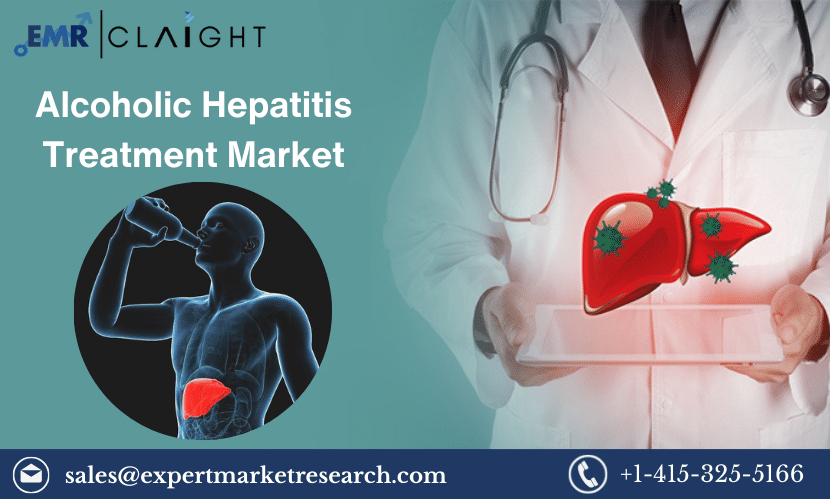Alcoholic Hepatitis Treatment Market Introduction
The global alcoholic hepatitis treatment market size will grow at a CAGR of 7% during the forecast period of 2024-2032. Globally, rising alcohol consumption has led to the alcoholic hepatitis treatment market growth. Alcoholic hepatitis is a serious and potentially life-threatening condition characterized by inflammation of the liver caused by excessive alcohol consumption.
In recent years, there have been significant advancements in the treatment of alcoholic hepatitis, leading to improved outcomes for patients. This article will provide an overview of the recent advancements in alcoholic hepatitis treatment, including novel therapies, emerging treatment strategies, key studies, and their impact on patient outcomes.
Traditional Treatment Approaches:
Traditionally, the mainstay of treatment for alcoholic hepatitis has been abstinence from alcohol and supportive care. In severe cases, corticosteroids have been used to reduce inflammation and improve liver function. However, these traditional approaches have limitations and are not always effective in all patients.
Recent Advancements in Alcoholic Hepatitis Treatment:
In recent years, there have been several advancements in the treatment of alcoholic hepatitis that have shown promising results. One such advancement is the use of pentoxifylline, a drug that has been shown to reduce inflammation and improve survival rates in patients with severe alcoholic hepatitis. Another promising therapy is N-acetylcysteine, which has antioxidant properties and has shown to improve liver function in patients with alcoholic hepatitis.
Get a Free Sample Report with Table of Contents@ https://www.expertmarketresearch.com/reports/alcoholic-hepatitis-treatment-market/requestsample
Emerging treatment strategies for alcoholic hepatitis include liver transplantation, which can be life-saving for patients with end-stage liver disease. Immune modulation therapies, such as the use of interleukin-22, are also being studied as potential treatments for alcoholic hepatitis. These therapies aim to modulate the immune response and reduce inflammation in the liver.
Key Studies and Research Findings:
Several recent studies have contributed to our understanding of alcoholic hepatitis and its treatment. One study found that early initiation of corticosteroid therapy in patients with severe alcoholic hepatitis can improve survival rates. Another study found that a combination of pentoxifylline and corticosteroids may be more effective than either treatment alone in improving outcomes for patients with severe alcoholic hepatitis.
Impact on Patient Outcomes:
The advancements in alcoholic hepatitis treatment have had a significant impact on patient outcomes. Studies have shown that these new treatments can improve survival rates, reduce the need for liver transplantation, and improve quality of life for patients with alcoholic hepatitis. Additionally, these treatments have the potential to reduce healthcare costs associated with managing alcoholic hepatitis.
Challenges and Future Directions:
Despite the significant advancements in the treatment of alcoholic hepatitis, several challenges remain, and there are areas for future research and development. Some of the key challenges and future directions in the field include:
Lack of Effective Treatments for Non-Responders:
While new therapies have shown promise, there is still a subset of patients with alcoholic hepatitis who do not respond to current treatments. Developing new therapies or identifying biomarkers to predict treatment response in these patients is a critical area for future research.
Understanding the Underlying Mechanisms:
Alcoholic hepatitis is a complex disease with multiple underlying mechanisms involved. Further research is needed to better understand these mechanisms and identify new targets for therapy.
Personalized Medicine:
There is a growing interest in personalized medicine for the treatment of alcoholic hepatitis. Tailoring treatment strategies based on individual patient characteristics, such as genetic predisposition and disease severity, could lead to better outcomes.
Addressing Comorbidities:
Many patients with alcoholic hepatitis have underlying comorbidities, such as obesity, diabetes, and cardiovascular disease, which can impact treatment outcomes. Future research should focus on developing holistic treatment approaches that address these comorbidities.
Long-Term Management:
Alcoholic hepatitis is a chronic condition that requires long-term management. Developing effective strategies for long-term care, including lifestyle modifications and ongoing monitoring, is essential for improving patient outcomes.
Access to Care:
Access to specialized care for alcoholic hepatitis can be limited in some regions. Improving access to care, particularly in underserved areas, is crucial for ensuring that all patients receive timely and effective treatment.
Collaboration and Data Sharing:
Collaboration among researchers, healthcare providers, and industry partners is essential for advancing our understanding of alcoholic hepatitis and developing new treatments. Encouraging data sharing and collaboration can accelerate progress in the field.
Media Contact:
Company Name: Claight Corporation
Contact Person: Louis Wane, Corporate Sales Specialist – U.S.A.
Email: sales@expertmarketresearch.com
Toll Free Number: +1-415-325-5166 | +44-702-402-5790
Address: 30 North Gould Street, Sheridan, WY 82801, USA
Website: https://www.expertmarketresearch.com
